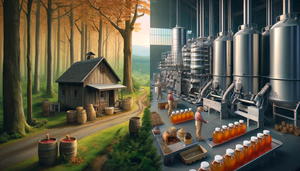Small-scale vs. Large-scale Production: The Maple Syrup Craft in Vermont
Jul 14, 2024
Vermont's maple syrup is renowned for its unparalleled quality and rich flavor, a testament to both the traditional methods of small-scale artisans and the efficiency of large-scale producers. This blog post delves into the contrasting techniques and challenges these producers face, highlighting each approach's unique benefits and hurdles.
The Art of Small-scale Maple Syrup Production
Small-scale maple syrup production in Vermont is a labor of love, steeped in tradition and meticulous craftsmanship. Artisans in this category often rely on methods passed down through generations, ensuring that each syrup bottle carries the essence of Vermont's forests.
Techniques
- Tree Tapping: Small-scale producers use traditional spiles and buckets, often manually collecting sap.
- Boiling Process: They typically employ wood-fired evaporators, imparting a unique smoky flavor to the syrup.
- Filtering and Bottling: The process is done in small batches, allowing for careful quality control and attention to detail.
Challenges
- Labor-Intensive: The process requires significant manual labor, from tapping trees to boiling sap.
- Seasonal Limitations: Production is highly dependent on weather conditions, with a short season for sap collection.
- Limited Output: Small-scale operations can only produce a restricted quantity of syrup, often leading to higher prices.
The Efficiency of Large-scale Maple Syrup Production
In contrast, large-scale maple syrup producers in Vermont leverage modern technology and economies of scale to meet the growing demand for this sweet treat. These producers focus on maximizing efficiency while maintaining high standards of quality.
Techniques
- Vacuum Systems: Large-scale producers often use vacuum systems to tap trees, increasing sap yield.
- Reverse Osmosis: This technology concentrates sap before boiling, reducing energy consumption.
- Automated Evaporators: These systems allow continuous boiling and precise temperature control, ensuring consistent quality.
Challenges
- Initial Investment: The equipment and technology required for large-scale production are expensive.
- Environmental Impact: Managing the ecological footprint of large-scale operations can be challenging.
- Consistency: Maintaining consistent quality across large batches requires stringent controls and monitoring.
Comparing the Benefits
|
Aspect |
Small-scale Production |
Large-scale Production |
|
Quality |
Unique flavors, artisanal quality |
Consistent quality, scalable |
|
Sustainability |
Often more sustainable, minimal impact |
Potential for higher impact but efficient |
|
Price |
Generally higher due to limited supply |
Competitive pricing due to economies of scale |
|
Market |
Niche, specialty markets |
Mass market, wholesale retailers |
The Consumer Experience
For maple syrup lovers, choosing between small-scale and large-scale production often depends on personal preference. Small-scale syrup offers a taste of tradition, with each bottle reflecting the care and expertise of the producer. It's perfect for those who value artisanal quality and are willing to pay a premium. On the other hand, large-scale syrup provides a reliable, high-quality product that is more accessible and affordable, making it an excellent choice for restaurants, wholesale retailers, and budget-conscious consumers.
FAQs
Q: What makes small-scale maple syrup unique? A: Small-scale maple syrup is often made using traditional methods, resulting in unique flavors and higher artisanal quality.
Q: Is large-scale production less sustainable? A: Large-scale production can have a higher environmental impact, but many producers employ sustainable practices to mitigate this.
Q: Which type of maple syrup should I choose? A: It depends on your preference. Choose small-scale syrup for unique, artisanal quality and large-scale syrup for consistent, affordable options.
Q: How can I tell if maple syrup is from Vermont? A: Look for labels that indicate it is 100% pure Vermont maple syrup, often certified by local authorities.


